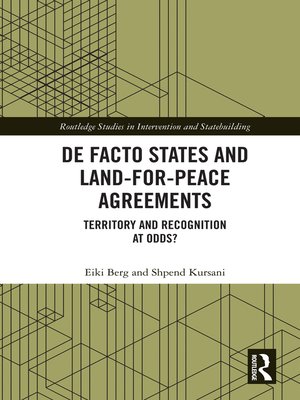De Facto States and Land-for-Peace Agreements
ebook ∣ Territory and Recognition at Odds? · Routledge Studies in Intervention and Statebuilding
By Eiki Berg

Sign up to save your library
With an OverDrive account, you can save your favorite libraries for at-a-glance information about availability. Find out more about OverDrive accounts.
Find this title in Libby, the library reading app by OverDrive.



Search for a digital library with this title
Title found at these libraries:
| Library Name | Distance |
|---|---|
| Loading... |
This book presents an analytical framework which assesses how 'land-for-peace' agreements can be achieved in the context of territorial conflicts between de facto states and their respective parent states.
The volume examines geographic solutions to resolving ongoing conflicts that stand between the principle of self-determination (prompted by de facto states) and the principle of territorial integrity (prompted by parent states). The authors investigate the conditions under which territorial adjustments can bring about a possibility for peace between de facto states and their parent states. It does so by interrogating the possibility of land-for-peace agreements in four de facto state–parent state pairs, namely Kosovo–Serbia, Nagorno–Karabakh–Azerbaijan, Northern Cyprus–Republic of Cyprus, and Abkhazia–Georgia. The book suggests that the value that parties put on land to be exchanged and peace to be achieved stand at odds for land-for-peace agreements to materialise. The book brings theoretical and empirical insights that open several avenues for discussions on the conservative stance that the international community has held on territorial changes in the post-1945 international order.
This book will be of much interest to students of statebuilding, state formation, secessionism, political geography, and international relations.







